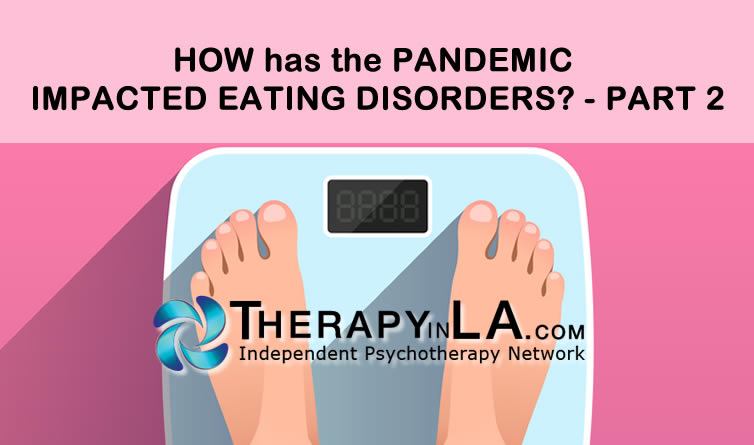HOW has the PANDEMIC IMPACTED EATING DISORDERS? – PART 2
HOW has the PANDEMIC IMPACTED EATING DISORDERS? – PART 2
By Alan M. Solomon, Ph.D.
Following up on the previous blog about heightened risks of eating disorders, there are red flags that hopefully get parents’ attention:
- Sudden weight loss of 10-20 pounds.
- A teenager becoming secretive about eating.
- Food disappearing.
- Suddenly skipping family meals.
- Refusing to eat certain categories of foods, like carbohydrates or processed foods.
- Obsessive concern with counting calories, exercising excessive amounts, or hoarding food.
- Expressions of guilt or anxiety about food or eating.
- Repeated feelings of dissatisfaction or discomfort with their bodies.
- An internet log with visits to worrisome websites.
Though it is usually thought of as a “white girls’” issue, teens of all ethnic groups, and boys, too, can struggle with eating disorders. Heterosexual boys tend to talk about getting fit, lean, or more muscular. LGBTQ kids may also respond to the anxieties of their identity struggles by using, and misusing food.
As with most psychological issues, early help is important. Parents with such concerns should consult with their pediatrician, family health provider, or a knowledgeable therapist (not all health care professionals are well-informed about eating disorders). Reliable information, tools for screening, and support are available online:
- The National Eating Disorders Association (NEDA) provides support for individuals and families.
- FEAST is a nonprofit organization operated by caregivers for those with eating disorders.
- Maudsley Parents is a parent-run program, created by parents who helped their kids recover with family treatment; it offers hope and help.
- The following offer many resources: Academy for Eating Disorders, Eating Disorders Center for Treatment and Research at UC San Diego, Eating Disorders Program at Boston Children’s Hospital.
Parents can also take preventive steps to avoid this development by modeling a balanced approach to eating themselves; this takes some self-reflection and assessment on the parent’s parts. Parents can also provide opportunities for physical activity, and by staying away from criticism of their own bodies or their teenager’s body. Family discussions about how much pressure is placed on kids, and adults, about dieting, appearance, shaming about weight and body size can help, along with separating body size from a person’s worth.
The therapists in the Independent Psychotherapy Network are attuned to these issues. We can be directly helpful to teenagers and their families, or help them secure effective help.
Alan M. Solomon, Ph.D. is a clinical psychologist in private practice in Torrance, CA. A member of the Independent Psychotherapy Network, he can be reached at 310 539-2772 or dralanms@gmail.com In-person or telehealth sessions are available.
Copyright 2022 by Alan M. Solomon, Ph.D.

